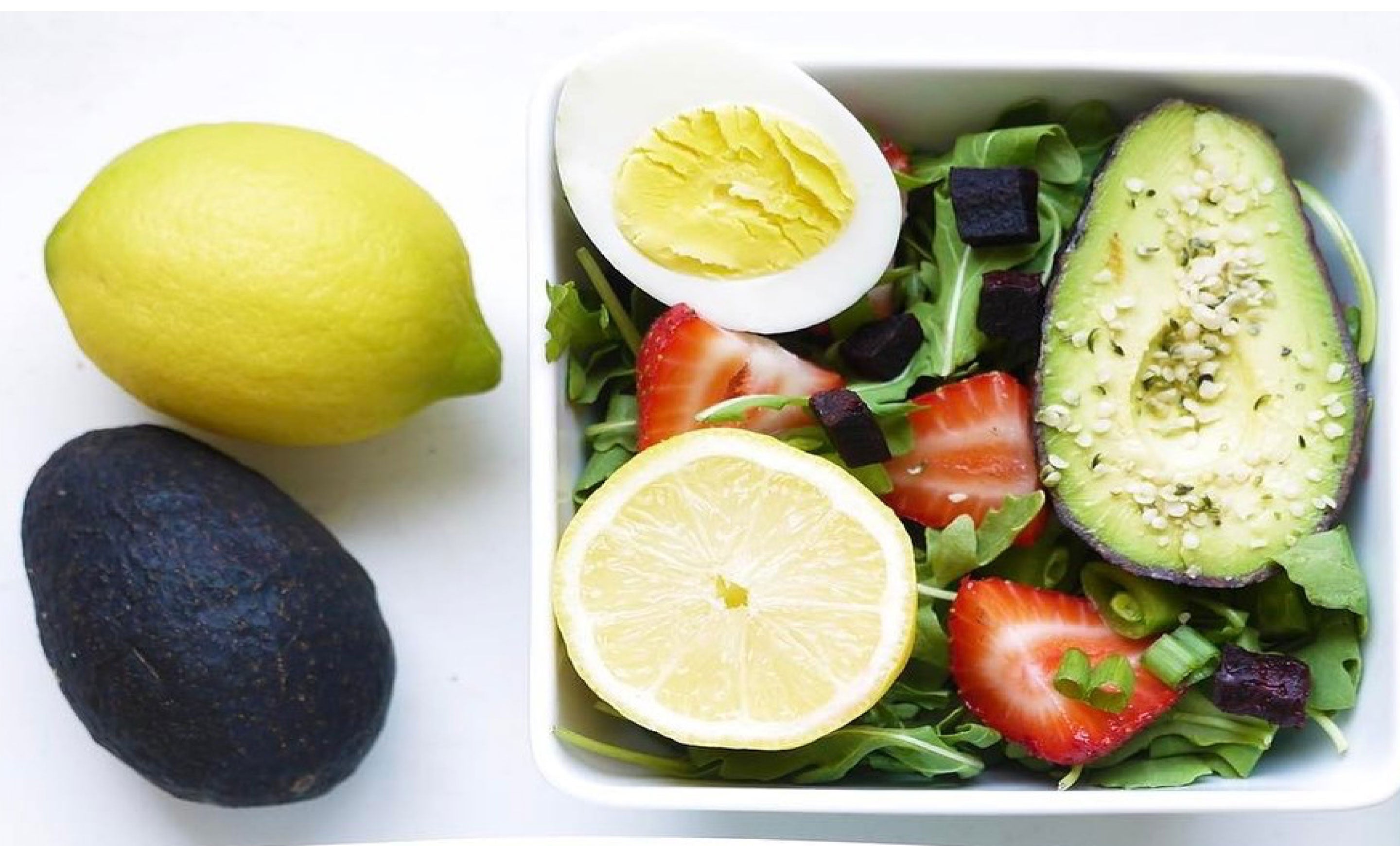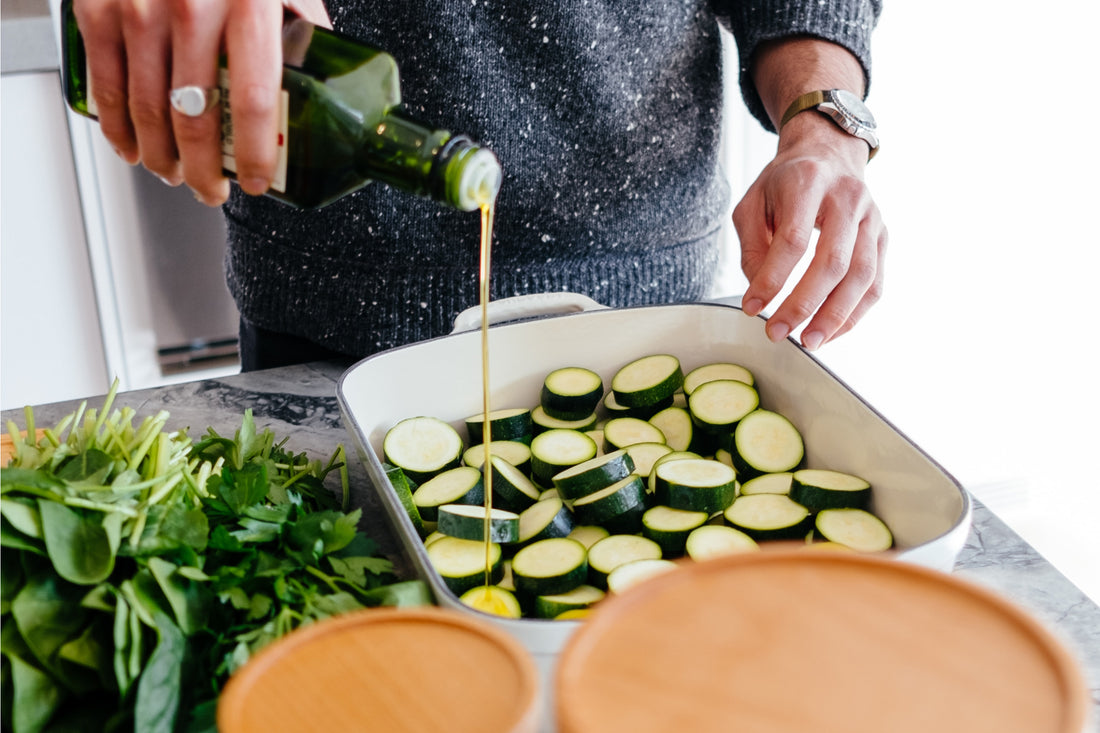Gone are the days of boring salads consisting of iceberg lettuce and sugar-laden dressings. Building a delicious salad with staying power is totally feasible and can help keep you healthy and energized. Packed with protein, fiber, healthy fats, vitamins and minerals – its the perfect, balanced meal! Here's your how-to to guide to salad-making.

Leafy Greens: 2 cups
Some favorites: kale, spinach, arugula, romaine
Leafy greens are the foundation to any salad. Forgo your iceberg lettuce devoid of valuable vitamins and minerals for dark leafy greens (the darker, the better!). Leafy greens are brimming with vitamins, minerals, and antioxidants. They are rich in both soluble and insoluble fiber, which help lower cholesterol levels and keep our digestion running smoothly.
Seasonal Veggies: 1 cup
Fall vegetables: winter squash, brussels sprouts, turnips
Winter vegetables: carrots, parsnips, onion
Spring vegetables: asparagus, cabbage, broccoli
Summer vegetables: cucumber, mushrooms, eggplant
Add unique textures and flavors to spice up your salad and make it fun to eat. Veggies, in general, are a great source of vitamins, minerals and fiber. Opt for seasonal produce. Not only is it more affordable and readily available, it is associated with higher nutrition and better flavor. They don't need to be raw! I love tossing roasted veggies like brussels sprouts or squash to my salads in the fall and winter months.
Protein: 3-4 ounces
Animal proteins: chicken, grass-fed beef, eggs, wild tuna, salmon
Plant proteins: lentils, chickpeas, black beans
Protein adds staying power to our salad and is beneficial for weight management because of its satiating effects. Animal proteins contain beneficial nutrients like iron and zinc in their most bioavailable form, meaning that we can readily digest, absorb and utilize them. Cold-water fish like salmon or sardines contain essential omega-3 fats, which support brain and heart health. Fish, meat and eggs are considered complete proteins meaning that they contain all the essential amino acids, or protein building blocks, that we must get from food. If you choose to forgo animal protein, opt for high-protein plant foods like legumes. Legumes contain a combination of protein and carbohydrates, ample fiber, vitamins, and minerals.
Whole Grains: 1/3 - 1/2 cup
Whole grains: quinoa, barley, brown rice, farro, amaranth, oats
Tossing in a serving of whole grains can add staying power to your salad and additional textures. Whole grains are a good source of fiber, B vitamins and even some protein. B vitamins aid metabolism and support hair, skin and nails. Some whole grains like quinoa and barley are considered complete sources.
Fruit: 1/4 - 1/2 cup
Fall fruit: apples, pears, raspberries
Winter fruit: apples, lemons, oranges
Spring fruit: strawberries, apricots, pineapple
Summer fruit: blueberries, blackberries, cherries
Seasonal fruit adds a touch of sweetness along with a slew of vitamins and minerals. This includes potassium, vitamin C, and beta-carotene, which we convert to vitamin A (important for skin and vision). Opt for in-season produce for the best taste and nutrition. Rotating your fruit with the seasons is a good way to ensure you are getting a range of vitamins, minerals and phytonutrients.
Healthy Fat Source: 1-2 tablespoons
Dressings: extra virgin olive oil, tahini
Other healthy fats: avocado, nuts and seeds, olives
Forgo store-bought salad dressings, which are often sugar-laden and packed with fillers. Instead, make your own at home using ingredients on hand. Healthy fats are important to pair with your salads. Many of the nutrients found in vegetables are fat-soluble meaning that they need a fat source to best be utilized and absorbed by the body. A drizzle of extra virgin olive oil and balsamic will do the trick or a lemon tahini dressing. Adding some fresh avocado slices will add creaminess to your salad while nuts and seeds can add crunch. Healthy fats are important for skin, hair, cushioning vital organs and producing hormones.







